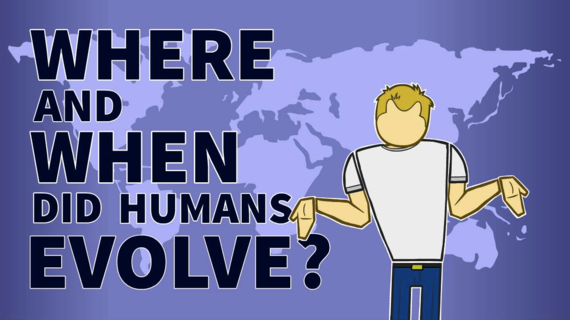Humans are a species that permanently inhabit every continent on the planet. But of course, like all other species, we've evolved. So where and when did this take place? Figuring out important temporal and spatial questions related to our own evolution has been one of the central missions for evolutionary anthropology over the past 100 to 150 years. In order to gain satisfactory answers we had to learn a lot about our closest relatives, our fossilized ancestors, and our own genomes. In the video below I attempt to explain how our understanding of evolution has developed:
It may be hard to imagine now, but when the theory of evolution by natural selection was first proposed back in the 19th century, no one had ever thought about where or when humans had evolved. This was because we didn't know humans had evolved! Consequently Charles Darwin was one of the first theorists to seriously contemplate human temporal and spatial origins within an evolutionary framework. As I explained in the video, his first intuition was correct, we evolved in Africa. In his masterwork The Descent of Man Darwin reasoned:
In each region of the world the living mammals are closely related to the extinct species of the same region. It is, therefore, probable that Africa was formerly inhabited by extinct apes closely allied to the gorilla and chimpanzee; and as these two species are now man's nearest allies, it is somewhat more probable that our early progenitors lived on the African continent than elsewhere.
However, what I didn't have time to go into was how intense 19th century debate was regarding human continental origins. Biologist Ernst Haeckel thought Asia was our original home because of his assertion that we were more closely related to orangutans than the African apes. This idea gained considerable support in 1891 when Eugene Dubois found the skeletal remains of Homo erectus on the island of Java. Haeckel was impressed with his finding, claiming: "[Java man] really seems to represent the 'missing link' so eagerly sought for, in the chain of transitional forms."
Many anthropologists at the time had their doubts. By the early 20th century, hundreds of Neanderthal remains had been found throughout Europe. Scientists began to speculate that different groups of humans had separate origins. This idea became the multi-regional hypothesis. Neanderthals were imagined to be the direct ancestor of Europeans, Java man the ancestor of Australian aboriginals, Peking man the direct ancestor of all East Asians, and Homo ergaster the ancestor of modern Africans.
Of course, eventually the multi-regional hypothesis fell out of favor when mounting fossil and genetic evidence confirmed Darwin's initial hypothesis.
As for the when regarding our evolution, there are still many questions that are far from resolved. One of the most pressing questions is about when we actually left Africa. There is archaeological evidence that we had left Africa more than 100,000 years ago. But genetic studies are mostly in conflict with one another, a few studies suggest a date between 60-90,000 years ago, while others suggest a date between 100-120,000 years ago. So it appears as though we'll need more research to resolve this ongoing debate. I personally think the ramifications of better understanding the date of our emergence from Africa will help us gain a more informed perspective on the nature of our relationship with other human species in Eurasia.
But at the end of the day, I think what we can all take away from an understanding of our own evolution is that we are all African apes. We all share common ancestry quite recently in the history of life. Our global presence is quite recent, and although we may look different, we are actually a genetically homogenous species compared to other great apes. This makes most of our differences superficial.
As I alluded to at the end of the video, I think understanding our own evolution should also give us pause, and make us realize that we exist within a truly bizarre period in our development as a species. We find ourself on the precipice of developing a global civilization. I can't wait to find out what will happen next!
If you enjoyed the video, please like, share, and subscribe! I'll be releasing a new video bi-weekly!
And if you want to connect with me: @cadelllast | fb.com/theadvancedapes | fb.com/cadell.last | G+ | youtube.com/theadvancedapes
